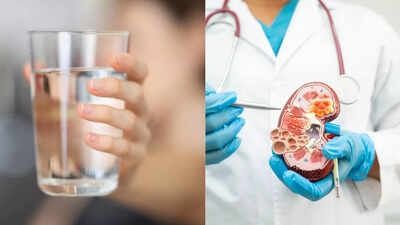
How water intake supports kidney function
Water helps the kidneys filter blood efficiently. Every day, kidneys filter around 50 gallons of blood, removing waste and excess fluids to produce urine. Without enough water, waste products become concentrated, increasing stress on the renal system.Adequate hydration offers several benefits for kidney function:
- Dilution of toxins: Proper hydration keeps urine less concentrated, reducing the risk of crystal formation and kidney stones.
- Improved filtration: Water helps maintain blood volume and pressure, allowing kidneys to filter more effectively.
- Support for electrolytes: Adequate fluid intake balances electrolytes like sodium and potassium, which are vital for muscle and nerve function.
- Reduced kidney stress: Consistent hydration reduces the workload on kidney nephrons, tiny filtering units that are susceptible to damage over time.
For individuals at risk of CKD or with early-stage kidney issues, these mechanisms are particularly important for maintaining kidney health over the long term.
Hydration and chronic kidney disease: Why consistent water intake matters
Chronic kidney disease affects millions worldwide, often developing silently over years. CKD can lead to reduced eGFR, proteinuria, and eventual kidney failure if not managed properly. Many myths exist around hydration in CKD: some believe that drinking water excessively may harm the kidneys, while others assume more water is always beneficial.Evidence shows that moderate, consistent hydration is crucial. Drinking water regularly helps prevent dehydration, reduces the concentration of waste in the urine, and supports overall kidney function. For people living with CKD, staying hydrated is an essential lifestyle strategy that complements medical care.
Practical tips for maintaining kidney health through hydration
Maintaining kidney health through water intake is about balance, consistency, and awareness. Here’s how to approach it:
- Drink steadily throughout the day: Avoid consuming large volumes in a single sitting; smaller, frequent sips maintain consistent hydration.
- Monitor urine colour: Pale yellow urine generally indicates adequate hydration; dark urine may suggest the need for more fluids.
- Incorporate hydrating foods: Fruits and vegetables such as watermelon, cucumber, oranges, and celery help support hydration naturally.
- Limit high-sodium beverages: Soda, packaged drinks, and processed foods can increase kidney strain and counteract hydration benefits.
- Adjust for lifestyle and climate: Hot weather, exercise, and sweating increase fluid requirements. Listen to your body’s signals.
Lifestyle strategies that complement hydration
Water intake alone cannot prevent kidney disease or reverse damage. Combining hydration with other healthy practices strengthens kidney protection:
- Blood pressure control: High blood pressure accelerates kidney damage. Regular monitoring and medication, if necessary, are essential.
- Blood sugar management: Diabetes is a leading cause of CKD. Controlling blood sugar levels reduces kidney stress.
- Balanced diet: Minimise processed foods, reduce salt, and increase fruits, vegetables, and lean protein.
- Avoid nephrotoxic substances: Overuse of painkillers, certain antibiotics, and excessive alcohol can damage kidneys.
- Regular exercise: Promotes cardiovascular health and supports proper kidney perfusion.
By pairing hydration with these lifestyle measures, individuals can effectively support kidney function and reduce the risk of CKD progression.
Common myths about water and kidney health
Myth 1: Drinking more water will cure kidney diseaseWhile hydration is essential for kidney function, drinking extra water cannot reverse kidney damage or cure chronic kidney disease (CKD). Overhydration, especially in patients with advanced CKD, may even be harmful, leading to fluid overload and strain on the heart and kidneys. Maintaining proper hydration supports kidney function but must be combined with medical management, including blood pressure control, diabetes management, and avoidance of nephrotoxic drugs according to the study.
Myth 2: All CKD patients should drink as much water as possibleFluid requirements vary for individuals with CKD. Patients with advanced kidney disease or those on dialysis may need to limit water intake to prevent fluid overload, swelling, and high blood pressure. A one-size-fits-all approach is unsafe; hydration should be personalized based on kidney function, urine output, and comorbid conditions such as heart failure as per the study published.
Myth 3: Clear urine always means perfect kidney healthWhile pale or clear urine often indicates good hydration, urine color alone is not a reliable marker of kidney health. Consistently clear urine may sometimes indicate overhydration, and kidney function depends on multiple factors, including filtration efficiency, presence of protein in urine (proteinuria), and overall renal health.
Kidney disease can exist even if urine appears normal according to the study published.
-
Fact Check: Did RCB Troll Sanju Samson & Ravindra Jadeja Trade Deal Ahead Of IPL 2026 Mini Auction?

-
Gujarati Actress Niilam Paanchal Misses Train To Mumbai After Cab Driver Misbehaves & Abuses Her: 'He Threatened to Drop Me Midway'

-
Veteran Actor Dharmendra To Celebrate 90th Birthday? Hema Malini & Family Make Plans As His Health Improves

-
'Pure Bullying, Highly Unacceptable': Akon's Pants Pulled Down By Fans During Bengaluru Concert, Netizens Call It 'Harassment' – VIDEO

-
Yuvraj Singh’s father Yograj Singh once played for India now dependent on others for food due to…, makes SHOCKING statement about…
